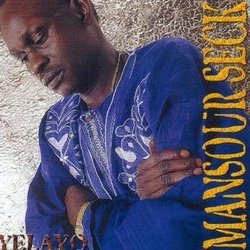WOW! One of the best African albums EVER!
"Ian Herrick" | San Jose, CA | 03/16/2005
(5 out of 5 stars)
"If "Djam Leeli" is music for a sunny afternoon, taking your thoughts into the clouds and even beyond into the stars, this album takes you into the primal underworld of Senegal. This music is DARK! This is the music of the rivers, the earth. Of blood, bone, and skin. This music has depth like the ocean, with its intense layers of voice, guitar, hoddu and bass.
The guitars and spike lutes form interweaving spirals of trance-inducing rhythms, and Mansour's gritty, smoky voice comes out like a tired and bone-weary bluesman, echoed by the bird-like chanting of his back-up singers (the sound quality and mastering, by the way, are excellent). The songs here are written by Mansour to reflect current issues in Senegal, Africa, and the world as a whole. They effectively blend traditional themes with current events. Mansour wants Africans to stay connected to their heritage. The song "Africa", for intstance, highlights the importance of music in African life. As a griot, Mansour also pays his respects to people: The song "Rewbe Fouta" honors the women of the Fouta (Fulani/Peul), while "Dona Bamba," one of the lighter, more airy songs, is about the importance of griots.
He also sings of war, of death and betrayal. The song "Thiaroye" is homage to the Senegalese soldiers who served in the French forces during WWII. Following the war the soldiers were stationed at Thiaroye, where they waited for their pay before being discharged. The Army officials would not pay, and following a demonstration by the soldiers summoned them to the headquarters the next morning, where they were subsequently massacred.
The song "Kareli" also deals with war. In it Mansour sings of all the places war is happening, and asks what will become of future generations if violence continues.
Love also is a theme here, with the song "Poolel," an allegory about the song of the turtle dove. A translation of part of the lyrics reads: "Please little dove, stay close to tonight, I'm afraid of the dark."
Listen to this song in the late hours, lose yourself in the African night, thinking of Fouta women and the cooing of the turtle dove. This is intense, thoughtful, deep music, and is absolutely one of the best albums of African music ever produced."


 Track Listings (12) - Disc #1
Track Listings (12) - Disc #1